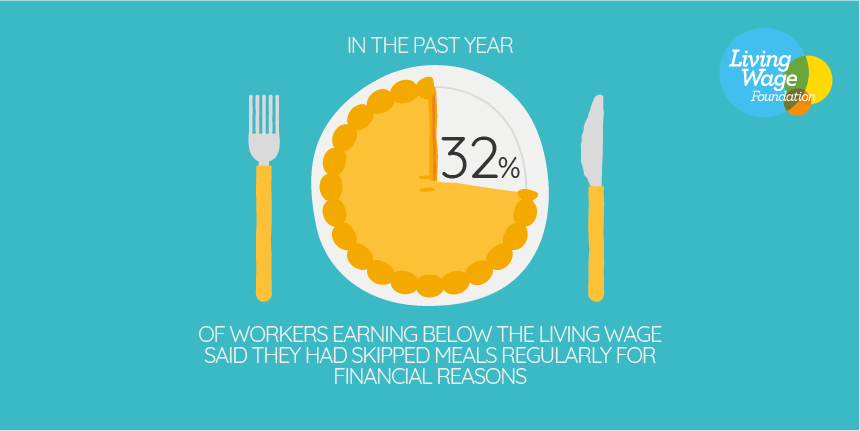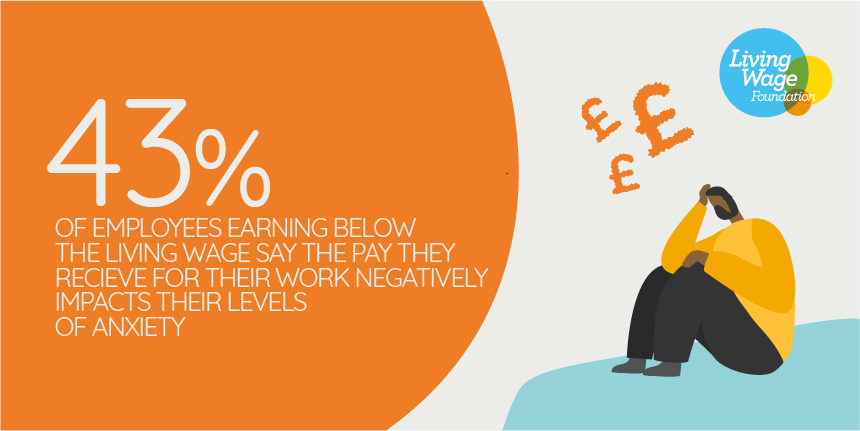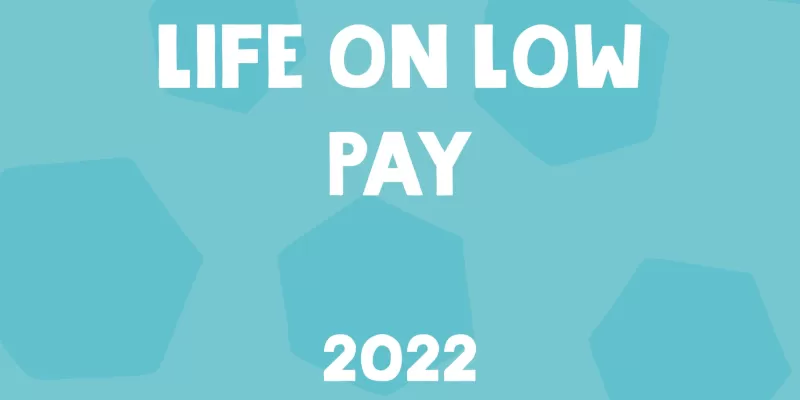New 'Life on Low Pay' research shows:
- Almost two-fifths (38%) of low-paid workers - 1.8m workers nationally - report falling behind on household bills in 2021, up from 29% in 2020;
- Nearly a third (32%) of low-paid workers - 1.5m nationally - have regularly had to skip meals for financial reasons, up from 27% in 2020; 28% - 1.3m nationally - report being unable to heat their homes for financial reasons, up from 20% in 2020;
- 17% - 813,000 workers nationally - said they had taken out a pay-day loan to cover essentials in the past year, up from 14% in 2020;
- Two-thirds (66%) said that earning a wage that covered their basic living costs would improve their mental health.

Historically high rates of inflation are hitting the lowest-paid in Britain even harder than Covid-19, with 38% of low paid workers falling behind on basic household bills, up from 29% in December 2020, new Living Wage Foundation research shows. Data was taken from a sample of over 1,700 workers earning less than the real Living Wage, by the Living Wage Foundation and Survation.
As the cost of living crisis worsens, the research found 28% of workers earning below the real Living Wage had been unable to keep their homes warm this winter, up from 20% in 2020. This issue was most prominent in Wales (37%) and the North of England (31%).
Similarly, 23% of workers had fallen behind on rent or mortgage payments, and 17% had been forced to take out payday loans just to cover the bare essentials, up from 20% and 14% in 2020 respectively. Those in London - where living costs are the highest - face a higher risk here, with 28% falling behind on rent or mortgage payments and 21% getting a payday loan to cover essentials.
Among people earning below the real Living Wage, the cost of living crisis has also affected certain groups disproportionately. Women have been more likely to have fallen behind on household bills (42%, compared to 35% of men) and been unable to heat their homes compared to men (29%, compared to 26% of men), and were also more likely to be skipping meals to make ends meet (35%, compared to 29% of men). Women also reported anxiety in greater numbers than men, with 50% of women saying their low pay negatively affected their mental health, compared to 38% of men.

Workers were also asked about what being paid the real Living Wage would mean for them, with the findings highlighting that the real Living Wage would provide greater security and safeguard a decent quality of life. As well as providing financial stability and alleviating some of the impacts of the rising costs of living, 63% of people said the Living Wage would improve their mental health, including two-thirds (67%) of women polled; similarly, 63% also said that it would also improve their family lives.
Katherine Chapman, Director, Living Wage Foundation said:
"Our polling paints an unsettling picture for millions of people as rising living costs compound the challenges of two years of the pandemic. Almost two-fifths of low-paid workers report having fallen behind on basic household bills, a third have had to skip meals and we've seen an increase in the use of payday loans -and all these trends have increased since 2020.
As many of us face growing financial insecurity, the real Living Wage offers a crucial lifeline to workers, anchoring their finances by earning a wage linked to the cost of living. There's no better way for businesses to offer protection and reward for their staff than by joining over 9,000 Living Wage employers to ensure that everyone who works for them, including people that kept us going during the pandemic like cleaners and security guards, earn the real Living Wage."
Dave Innes, Head of Economics, Joseph Rowntree Foundation said:
"Work should provide a route out of poverty, but a combination of low pay, too few hours and insecure work means that many low-paid workers are at risk of real hardship as the cost of living rises. It is deeply worrying that so many low-paid workers are already skipping meals and taking on debt. With inflation projected to hit 7% in April, it's clear that people on low incomes, who spend a higher proportion of their income on essentials, are at the sharpest end of the crisis.
The Chancellor has chosen not to target support towards low-income families, and as a result the measures he announced will only cover half of the average jump in energy bills, and for some low-income families only around a third of this extra cost."
For more information and any further enquiries, please contact:
- John Hood: john.hood@livingwage.org.uk / 07507 173649
- Tom Blin: thomas.blin@livingwage.org.uk / 07706 217589
Notes to Editors
A sample of 1,702 British adults over the age of 18, working full-time and earning below the real Living Wage of £11.05 in London and £9.90 in the rest of the UK was surveyed by Survation from 6-18 January 2022. Data from 2020 was taken from the same survey of 2,000 low paid workers earning less than the Living Wage, surveyed by Survation between 6th-18th December 2020.
Case studies of low-paid workers can be made available on request.
Life on Low Pay 2022
During a period of unprecedented rises to the cost of living. Polling of employees in the UK earning less than the real Living Wage in January 2022 highlights the impacts of low pay on this group. Read the report.

